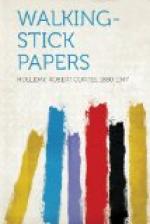No reader of The Spectator will have forgotten an article which appeared there some years ago entitled “As to Bears.” Or ever will forget it until his shall be “the shut lid and the granite lip of him who has done with sunsets and skating, and has turned away his face from all manner of Irish,” as William Vaughn Moody says. Not only because it was one of the finest things ever in The Spectator, or anywhere else (after, possibly, that imperishable dissertation of the great Dean’s—or was it Sir William Temple’s?—“On a Broomstick"), but also because it was one pure flower in our day of a kind of art little cultivated any more. “As to Bears.” All, me! How engaging, simple, gracious, and at ease; what perfection of literary breeding; what an amused and genial wave of the finger tips; how marked by good-humoured acuteness, and animated nonchalance; how saturated with a distinguished, humane tradition of letters—that title!
That is just the note I would strike in the great book I have been brooding for years, “Bums I Have Known.” It has been my felicity to have known more bums, I think, than any living man. But I fear I shall never get that book written. And this is a pity. It is a pity because this book would be of great value in the years to come. With our modern passion for efficiency, and with efficiency rapidly becoming compulsory everywhere, that colourful class of ancient lineage, the bums, is quickly becoming persona non grata to our civilisation, and will soon be extinct. To the next generation, in all probability, the word bum will be but an empty name. I doubt whether it would be a feasible plan for Dr. Hornaday to undertake to preserve a small number of this species in the Bronx Park. The bum nature, I fear, would languish in captivity. The creature would likely lose its health, and, worse, its spirits. It is a nomad, a child of nature. It takes no thought for the morrow, as our modern prophets teach us to do. I remember well an excellent bum (I mean excellently conforming to type), one Bain, who, growing restive under restraint, lost a position which he happened to have. I asked him what he was going to do now. There was something sublime about that being. He had faith that the Lord would provide. His simple reply was: “Well, the ravens fed Elijah.”
Stuffed bums in the American Museum of Natural History would not be any good. Any good, that is, as objects of study. Our children will require to know, to see the past steadily and see it whole, the habits of bums, their manners and customs. So, as I say, my work would be invaluable. The wastrel (as they say in England) has, of course, been celebrated in the literature of the past from time immemorial. I can’t at the moment put my finger on any, but I have no doubt there are bums in the pages of Homer, That Persian philosopher who found paradise enow with a jug of wine and a book of verse beneath a bough, Falstaff, Richard Swiveller,




